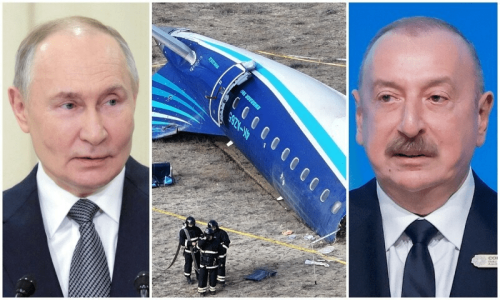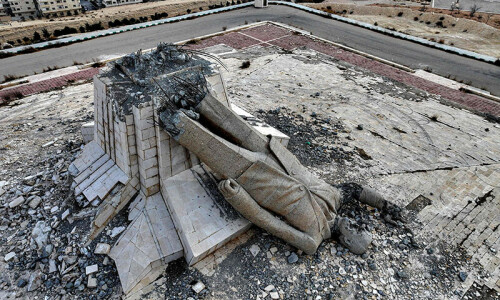TEN years after the devastating crime against humanity that altered New York’s skyline and claimed nearly 3,000 American lives, there is evidence aplenty that so-called counter-terrorism can be deadlier than terrorism.
The violence of the weak cannot hope to match the vengeance of the powerful. The difference, of course, is that the latter is supposedly justifiable. America came under attack, so it had to retaliate. It considered itself at war, so that misconception had to be translated into reality. Open-ended conflict is the new reality. The idea of peace is so 20th-century; there’s no visible room for it in the cowardly new world.
It is easy enough, and not entirely unreasonable, to blame the consequences of 9/11 on Al Qaeda. Its intentions were no doubt malicious in the extreme. Whatever the motivating factors, the intention behind the atrocities was to provoke a conflict. The United States could, of course, have refused to take the bait.
A special forces operation focusing on the Al Qaeda stronghold of Tora Bora may well have succeeded in targeting the instigators of the crime (the actual perpetrators were, of course, all dead). Combined with a judicious reassessment of American foreign policy — possibly entailing a gradual withdrawal of support from Middle Eastern dictators and a loosening of bonds with the Likud mentality in Israel — such a strategy may have brought the global view of the US into closer proximity with its broad self-image as a benign force in international affairs.
That would arguably have been too much to expect even from a relatively sensible regime in Washington. It was more or less out of the question for an administration dominated by neoconservatives — in other words, the radical right — who were eagerly on the lookout for an excuse to invade Iraq.
(The regime’s self-described Darth Vader has lately confessed that aggression against Syria, too, was on his mind — but no one else was quite crazy enough to concur. If the autobiographies of Tony Blair and George W. Bush deserved to be displayed in the crime section of bookstores, Dick Cheney’s effort surely deserves a slot in the gothic horror department.)
The ‘need’ to conquer Afghanistan was viewed in certain quarters as something of a distraction, and the ‘been there, done that’ mentality prevailed when the focus shifted to Iraq within a year and a half. The excuse, it’s easy to forget, was Saddam Hussein’s ‘weapons of mass destruction’. A slightly more subtle assault on the public consciousness suggested he was somehow behind 9/11.
The absurdity of the proposition, inadequately tackled by the American media, did not lead to much subsequent embarrassment in Washington. Once more it was a case of been there, done that.
The security state inaugurated by Harry Truman and reinforced four decades later by Ronald Reagan had reached its apotheosis by reinventing its raison d’être. The extended assault on civil liberties in the name of combating communism had eventually begun to peter out. A new enemy had to be found following the Soviet Union’s self-immolation, and Al Qaeda and its cohorts rose to the challenge.
Relative to the military power of the US, Al Qaeda has always been something of a nonentity, barely comparable in any reasonable analysis to the threat purportedly posed by the USSR and international communism. But it fit the bill, aided by its propensity to instigate or carry out spectacular acts of brutality.
It was, after all, nurtured in the culture of the crusade in Afghanistan against the Soviet Union and its allies, when the Mujahideen received their training in cut-throat terrorist techniques directly or indirectly from American and other western sources. Jihad, at the time, was an exalted concept in the American vocabulary.
This is not an aspect of 20th-century that figures prominently in discourses about the aftermath of 9/11. It’s inconvenient to recall, after all, that the Taliban are essentially the illegitimate products of a sordid ménage à trois that involved a fundamentalist military regime in Pakistan, the obscurantist rulers of Saudi Arabia and the ‘freedom-loving’ US.
It is similarly considered impolitic to dwell too much on the western support Saddam received during the war he launched against Iran. A more recent example of hypocrisy has emerged lately in evidence of collusion with the Libyan regime of Muammar Qadhafi, notably in the context of ‘extraordinary rendition’ — which essentially involves those suspected of terrorist involvement or even sympathies being dispatched at great cost to countries where they are bound to be tortured.
Embarrassingly for the West, Abdul Hakim Belhaj, now the security chief in Tripoli, has demanded an apology from London and Washington for their role in seizing him in Bangkok in 2004 and handing him over to the Libyan authorities. But rest assured that such episodes will soon be all but forgotten.
Certain inconvenient aspects of 9/11 are indeed being revisited this week, notably the conviction among a number of former American intelligence operatives that better coordination between the CIA and the FBI could have foiled the dastardly plot. Some attention has also been focused on the CIA’s transformation from an information-gathering agency into a killing machine.
That may be something of an exaggeration, in the sense that ‘eliminations’ also figure fairly frequently in the Company’s past, although its rededication to assassinations has entailed casualties on a much grander scale.
Osama bin Laden and his lot were driven to some extent by an aggrandised notion of their role in the defeat and demise of the Soviet Union, which led them to imagine they could also destroy another superpower — by provoking a war. It was, on several levels, an incredibly stupid idea. But America came to the party, and even exceeded expectations by turning Iraq into a battlefield.
At a conservative estimate, the cost this has entailed in terms of human lives is almost a hundred times the 9/11 toll. For the most part, the victims, unlike their American counterparts, will remain unsung and un-eulogised. There’s plenty of evidence that 21st-century imperialism will not long endure. But by the time that is incontrovertibly established, a great many more lives will have been wasted.The crime enacted 10 years ago on Sunday was horrendous. It would have made sense to treat it that way. The aftermath — as western commentators, barring a few honourable exceptions, will no doubt neglect to note this week — has literally been a hundred times worse.












































Dear visitor, the comments section is undergoing an overhaul and will return soon.